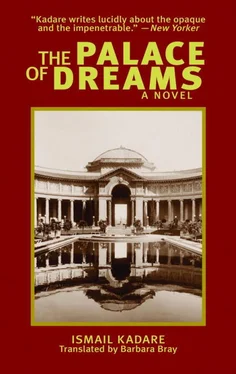Ismail Kadare
THE PALACE OF DREAMS
A Novel
TRANSLATED FROM
THE FRENCH OF JUSUF VRIONI
BY BARBARA BRAY
The curtains were letting in the uncertain light of dawn, and as usual he pulled up the blanket in the hope of dozing on a while longer. But he soon realized he wouldn’t be able to. He’d remembered that this sunrise heralded no ordinary day, and the thought drove away all desire for sleep.
A moment later, as he groped by the bed for his slippers, he felt an ironical grimace flit briefly over his still-numb face. He was dragging himself from his slumbers in order to go to work at the Tabir Sarrail, the famous bureau of sleep and dreams. To anyone else the paradox might have seemed wryly entertaining, but he was too anxious to smile outright.
A pleasant aroma of tea and toast floated up from downstairs. He knew both his mother and his old nurse were awaiting him eagerly, and he did his best to greet them with some show of warmth.
“Good morning, Mother! Good morning, Loke!”
“Good morning, Mark-Alem. Did you sleep well?”
There was a gleam of excitement in their eyes, connected, no doubt, with his new appointment. Perhaps, like himself not long before, they’d been thinking this was the last night when he’d enjoy the peaceful sleep of ordinary mortals. From now on his life was bound to be different.
As he ate his breakfast he couldn’t concentrate his thoughts on anything, and his anxiety continued to grow. When he went upstairs to dress, instead of going back to his room he went into the big drawing room. The pale blue tones of the carpet had lost their power to soothe. He went over to the bookshelves and, just as he had done the day before in front of the medicine cabinet, stood for some time gazing at the titles on the spines of the books. Then he put out his hand and took down a heavy folio volume bound in dark-brown, almost black, leather. It was years since he’d last opened it. It contained the history of his family, and on the cover some unknown hand had inscribed the title, The Quprilis from Generation to Generation, followed by the French word, Chronique.
As he turned the pages he had difficulty following the lines of manuscript, the style of which varied with the different authors. It wasn’t hard to guess that most of the writers had been old men, or else younger ones confronting the end of their lives or on the brink of some great misfortune—the sort of occasion when people feel an irresistible need to leave some testimony behind them.
The first of our great family to attain high office in the Empire was Meth Quprili, horn some three hundred years ago in a small town in central Albania.
Mark-Alem heaved a deep sigh. His hand went on turning the pages, but his eyes paused only on the names of viziers and generals. Lord, they were all Quprilis! he thought. And when he woke up he’d been stupid enough to wonder at his own appointment! He really must be a prize idiot.
When he came upon the words Palace of Dreams, he realized he’d been trying both to find and to avoid them. But it was too late to skip to the next page.
Our family’s connections with the Palace of Dreams have always been very complicated. At first, in the days of the Yildis Sarrail, which dealt only with interpreting the stars, things were relatively simple. It was when the Yildis Sarrail became the Tabir Sarrail that they began to go wrong….
Mark-Alem’s anxiety, which a short while ago had been distracted by all those names and titles, now seized him by the throat once more.
He started leafing through the Chronicle again, but this time roughly and fast, as though a gale had suddenly started to blow through the tips of his fingers.
Our patronymic is a translation of the Albanian word Ura (qyprija or kurpija); it refers to a bridge with three arches in central Albania, constructed in the days when the Albanians were still Christians and built with a man walled up in its foundations. After the bridge, which he helped to build, was finished, one of our ancestors, whose first name was Gjon, followed an old custom and adopted the name of Ura, together with the stigma of murder attached to it.
Mark-Alem slammed the book shut and hurried from the drawing room. A few moments later he was out in the street.
It was a wet morning, with a light sleet falling. The tall buildings, looking down on the bustle in the streets with their heavy doors and wickets still shut, seemed to add to the gloom.
Mark-Alem buttoned his overcoat right up to the neck. As he glanced at the swirls of delicate flakes fluttering around the wrought-iron streetlamps, he felt a cold shudder run down his spine.
As usual at this hour of the day the avenue was full of clerks from the ministries hurrying to get to their offices on time. Mark-Alem wondered several times as he went along whether he ought to have taken a cab. The Tabir Sarrail was farther away than he’d thought, and a thin layer of half-melted snow was making the pavements slippery.
He was now walking past the Central Bank. A little farther on, a line of frost-covered carriages stood outside another imposing building. He wondered which ministry it was.
Someone in front of him skidded on the pavement. Mark-Alem watched him as he tried to recover his balance, fell, picked himself up, examined—muttering an oath as he did so—first his bespattered cape and then the place on which he’d slipped, and finally continued on his way, somewhat dazed. Keep your eyes open! Mark-Alem said inwardly, not quite sure if he was warning the stranger or himself.
As a matter of fact, there was no need for him to worry. He hadn’t been told to present himself at the office at any particular time; he wasn’t even sure he had to be there in the morning. He suddenly realized he had no idea of the hours that were kept at the Tabir Sarrail.
Somewhere in the mist, away to his left, a clock let out a brazen chime, addressed as if to itself. Mark-Alem walked on faster. He’d already turned up his fur collar, but now involuntarily made as if to turn it up again. In fact, though, it wasn’t his neck that was cold, but a specific place in his chest. He felt in the inside pocket of his jacket to make sure his letter of recommendation was still there.
He suddenly noticed there were fewer people about than before. All the clerks are in their offices already, he thought with a pang. But he soon calmed down; his position was quite different from theirs. He wasn’t a civil servant yet.
In the distance he thought he could make out a wing of the Tabir Sarrail, and when he got nearer he found he was right. It really was the Palace, with its faded cupolas which looked as if they’d once been blue, or at least bluish, but which were now almost invisible through the sleet. This was one of the sides of the building. The front must face on to the street around the comer.
He crossed a small, almost deserted esplanade, over which rose the strangely slender minaret of a mosque. Yes, here was the entrance to the Palace. Its two wings stretched away into the mist, while the main part of the building stood back a little as if recoiling from some threat. Mark-Alem felt his anxiety increase. Before him lay a long series of identical entrances, but when he got nearer he realized that all these great doors, wet from the sleet, were closed, and looked as if they hadn’t been opened for some time.
Читать дальше













